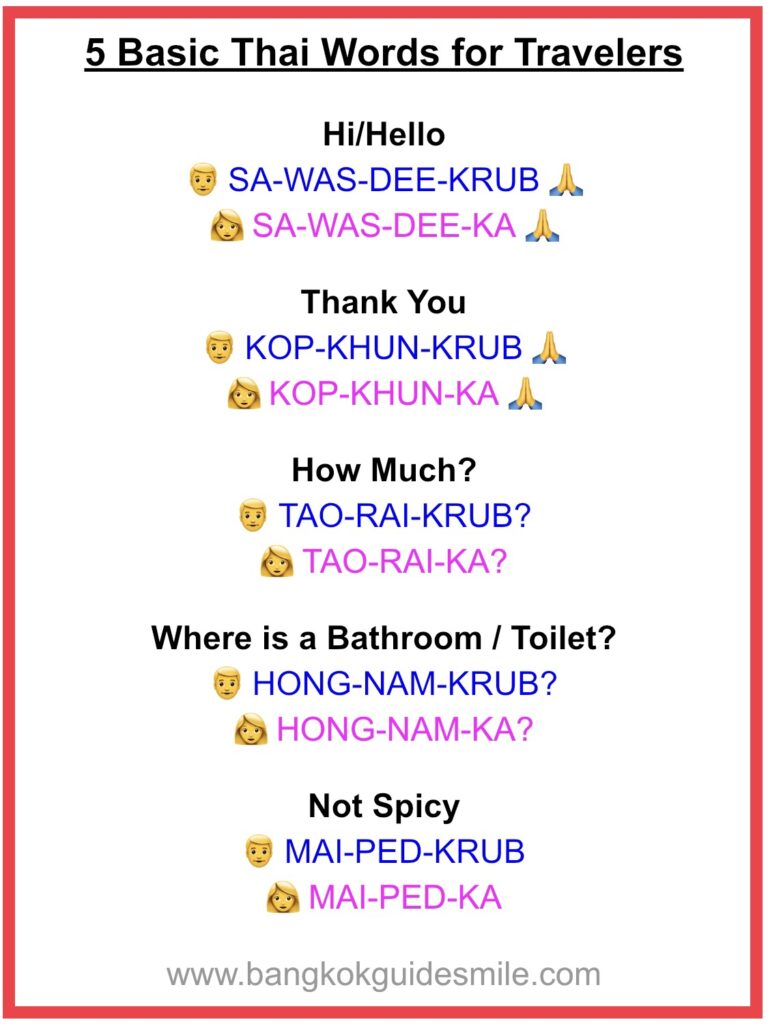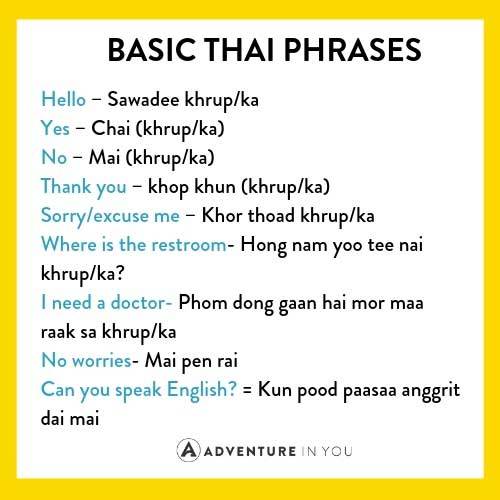Are you planning a trip to Thailand? Have you ever wondered how to communicate with the locals? Well, you’re in luck! In this article, we’ll be discussing some essential phrases that you must know when traveling to Thailand. So, whether you’re visiting the bustling streets of Bangkok or relaxing on the beautiful beaches of Phuket, these phrases will come in handy during your adventure. Let’s get started!
Now, I know what you might be thinking – learning a new language can be quite intimidating. But fear not! We’ve got you covered. With these must-know phrases, you’ll be able to navigate your way through the country with ease. From greetings to ordering food, we’ll teach you the basics so you can confidently interact with the locals. And the best part? You’ll even impress the Thai people with your newfound language skills!
In our article, we’ll cover the essentials – greetings, asking for directions, ordering food, and basic phrases for everyday conversation. You’ll learn how to say hello, thank you, and excuse me. We’ll also provide you with useful phrases to help you find your way around town, and of course, how to order your favorite Thai dishes without any confusion. By the end of this article, you’ll be armed with all the necessary phrases to enhance your travel experience in Thailand. So, what are you waiting for? Let’s dive in and learn some Thai!
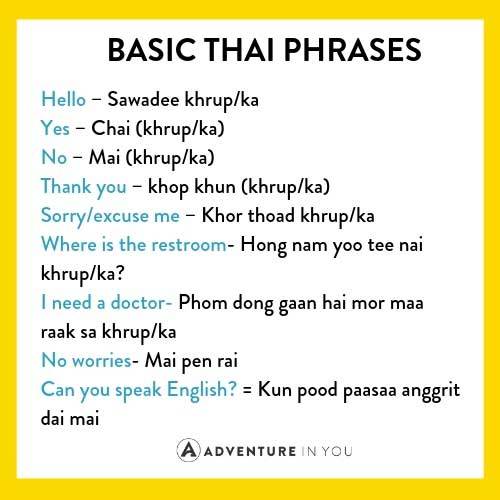
Introduction to Thai Language
The beauty and complexity of the Thai language
When planning your trip to Thailand, immersing yourself in the country’s rich culture and vibrant atmosphere is essential. And what better way to do that than by learning the Thai language? With its unique alphabet, tonal pronunciation, and warm, melodic cadence, the Thai language is both fascinating and challenging to master. Although many Thais can communicate in English, taking the time to learn a few basic Thai phrases will not only impress the locals but also enhance your travel experience.
Why learning Thai can enhance your travel experience
Traveling to a foreign country can sometimes be overwhelming, especially if you’re not familiar with the local language. But embracing the Thai language can open up a world of opportunities and create unforgettable experiences. The locals will appreciate your effort and be more willing to engage with you on a deeper level. From navigating transportation to ordering food and drinks, learning Thai will empower you to explore off-the-beaten-path destinations, interact with locals, and truly immerse yourself in the vibrant Thai culture.
The importance of learning basic Thai phrases
While English is widely spoken in tourist areas, venturing outside of these hubs can be challenging without some knowledge of the local language. By learning a few basic Thai phrases, you can bridge the communication gap and navigate everyday situations with ease. Whether it’s greeting locals, ordering food at a street stall, or seeking help in an emergency, knowing even a few essential phrases can make a significant difference. So, let’s dive into some must-know phrases for your Thai adventure!
Greetings and Basic Polite Expressions
Saying hello and introducing yourself
“Hello” is one of the first phrases you’ll want to learn in any language. In Thai, the traditional greeting is “Sawatdee,” pronounced as sah-wah-dee. To make it more formal, you can add “kha” for females and “khrap” for males at the end. A polite way to introduce yourself is “Phom chue…,” or “Chane chue…” for females, followed by your name. Thais will appreciate your effort to greet them in their native tongue.
Thanking and expressing gratitude
Thais are known for their warm and friendly nature, so expressing gratitude is an essential part of Thai culture. To say “thank you” in Thai, you can say “Khob khun” pronounced as kawp-koon. To make it more formal, add “kha” for females and “khrap” for males. For a more heartfelt thank you, you can say “Khob khun mak kha/khrap.” Thais will be delighted by your display of appreciation.
Apologizing and asking for permission
Mistakes happen, and knowing how to apologize is crucial in any language. To apologize in Thai, you can say “Kho thot” pronounced as kaw-thot, which means “I’m sorry.” If you want to be more formal, add “kha” for females and “khrap” for males. If you need permission to do something, you can say “Kor thot kha/khrap,” which means “May I?”
Navigating Transportation
Asking for directions
Navigating transportation can be a daunting task, especially in a foreign country. But fear not! By learning a few key phrases, you’ll be able to ask for directions and get where you need to go. To ask “Where is…?” in Thai, you can say “Yoo nai…?” pronounced as yoo-nai. Simply insert the name of your destination after “Yoo nai.” For example, to ask “Where is the train station?”, you can say “Yoo nai satahne rotfai?”
Using public transportation
Public transportation is an efficient and cost-effective way to explore Thailand. To ask “How much is the fare?” in Thai, you can say “Laeo tao rai?” pronounced as lao-tao-rai. When boarding a bus or a train, you can say “Charn” pronounced as chaan, which means “I want to get on.” And to signal your desired stop, you can say “Yut” pronounced as yoot, which means “I want to get off.”
Hailing a taxi or tuk-tuk
Taxis and tuk-tuks, the iconic three-wheeled vehicles, are abundant in Thailand. To hail a taxi, you can simply raise your hand and say “Taxi krup/kha.” Krup for males and kha for females. If you prefer to travel in a tuk-tuk, you can say “Tuk-tuk krup/kha.” It’s important to negotiate the fare before getting in, as most taxis and tuk-tuks in Thailand don’t have meters.
Ordering Food and Drinks
Menu navigation and dietary restrictions
One of the highlights of visiting Thailand is the incredible cuisine. From flavorful street food to fine dining, Thailand offers a vast array of delicious dishes. To navigate a menu, you can say “Kor ao menyuan,” which means “Can I have a menu?” If you have dietary restrictions or allergies, it’s crucial to communicate them to the waitstaff. For example, if you’re vegetarian, you can say “Chan gin mungsawirat.”
Common phrases for ordering at restaurants
When you’re ready to order, it’s helpful to know a few key phrases. To ask for a particular dish, you can say “Kor ao…,” followed by the name of the dish. For example, “Kor ao pad thai,” which means “Can I have pad Thai?”. To request the bill, you can say “Check, please,” pronounced as “Kor gin bin.” And if you enjoyed your meal, you can say “Aroy maak” pronounced as ah-roy-mak, which means “Delicious!”
Asking for the bill and leaving a tip
In Thailand, it’s common for the bill to be brought to your table without you having to request it. However, if you find yourself waiting, you can politely ask for the bill by saying “Check, please,” as mentioned earlier. When it comes to tipping, unlike in some Western countries, tipping is not expected in Thailand. However, leaving small change or rounding up the bill is appreciated as a gesture of gratitude for good service.
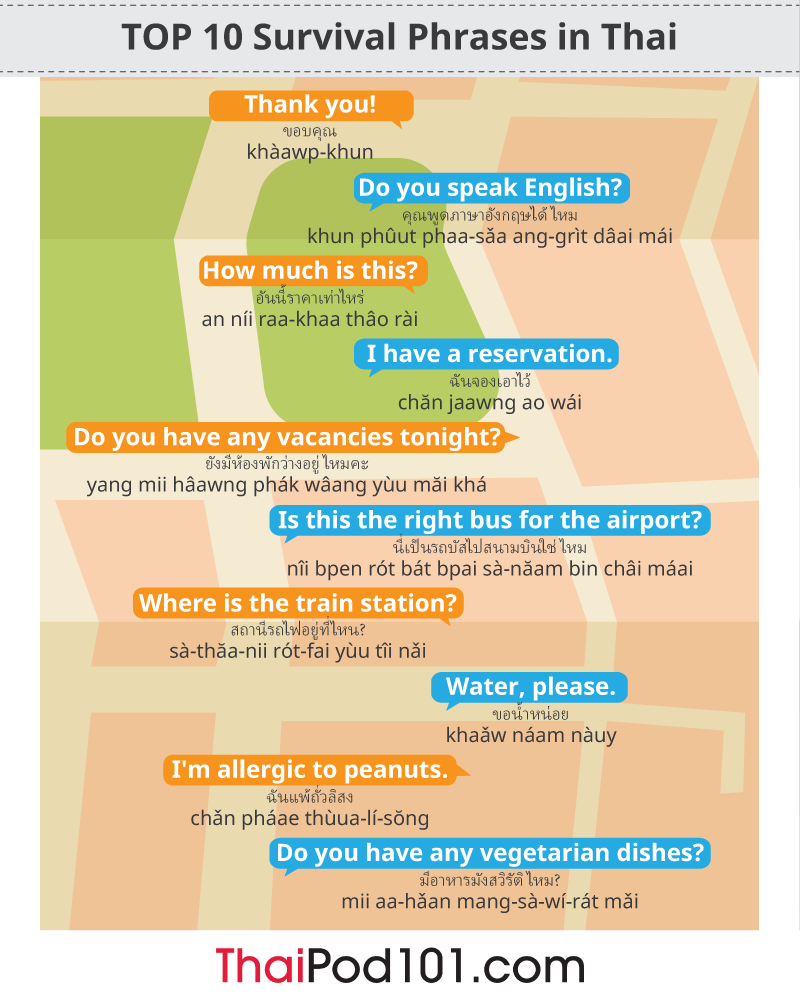
Shopping and Bargaining
Basic phrases for shopping
Shopping in Thailand can be a delightful experience, especially at the bustling markets and vibrant night bazaars. To ask “How much is this?” you can say “Ani tao rai?” pronounced as ah-nee tao-rai. If you see something you like, you can say “Chop” pronounced as chawp, which means “I like it.” And if you’re not interested, a polite way to decline is to say “Mai ow” pronounced as mai-ow, which means “I don’t want it.”
Negotiating prices and haggling
In Thai markets, bargaining is a common practice. To negotiate a lower price, you can ask “Can you make it cheaper?” by saying “Laeo thoeng dai mai?” pronounced as lao-taeng-dai-mai. If you’re not comfortable with the price offered, you can counter with a lower offer by saying “Cha-lit” pronounced as cha-lit, which means “lower.” Remember to approach the process with a friendly and respectful attitude.
Asking for help and recommendations
If you need assistance while shopping, don’t hesitate to ask for help. To ask “Can you help me, please?” in Thai, you can say “Chawng chuay chan dieow?” pronounced as chawng-chuay-chan-diew. Thais are generally helpful and friendly, and they will be more than willing to assist you in finding what you’re looking for. If you’re in a market and looking for a specific item, you can say “Rao kor thot tee nai?” which means “Where can I find…?”
Emergency Situations
Asking for medical assistance
While nobody wants to think about emergencies while traveling, it’s important to be prepared just in case. To ask for medical assistance, you can say “Chawp pom areay sakarey” pronounced as chawp-pom-a-ray-sa-karay, which means “I need medical help.” It’s also a good idea to keep a list of emergency numbers, such as the local ambulance service, at hand.
Reporting a lost or stolen item
In unfortunate situations where you have lost or had something stolen, it’s important to report it to the authorities. To report a lost or stolen item to the police, you can say “Kor naa tong-anan” pronounced as kor-naa-tong-a-naan, which means “I lost something.” Be sure to provide as much detail as possible to assist the police in their investigation.
Seeking help from the police
If you find yourself in need of assistance from the police, you can approach them and say “Chawp pom tong-taan” pronounced as chawp-pom-tong-taan, which means “I need help.” The police in Thailand are generally friendly and approachable, and they will do their best to assist you.
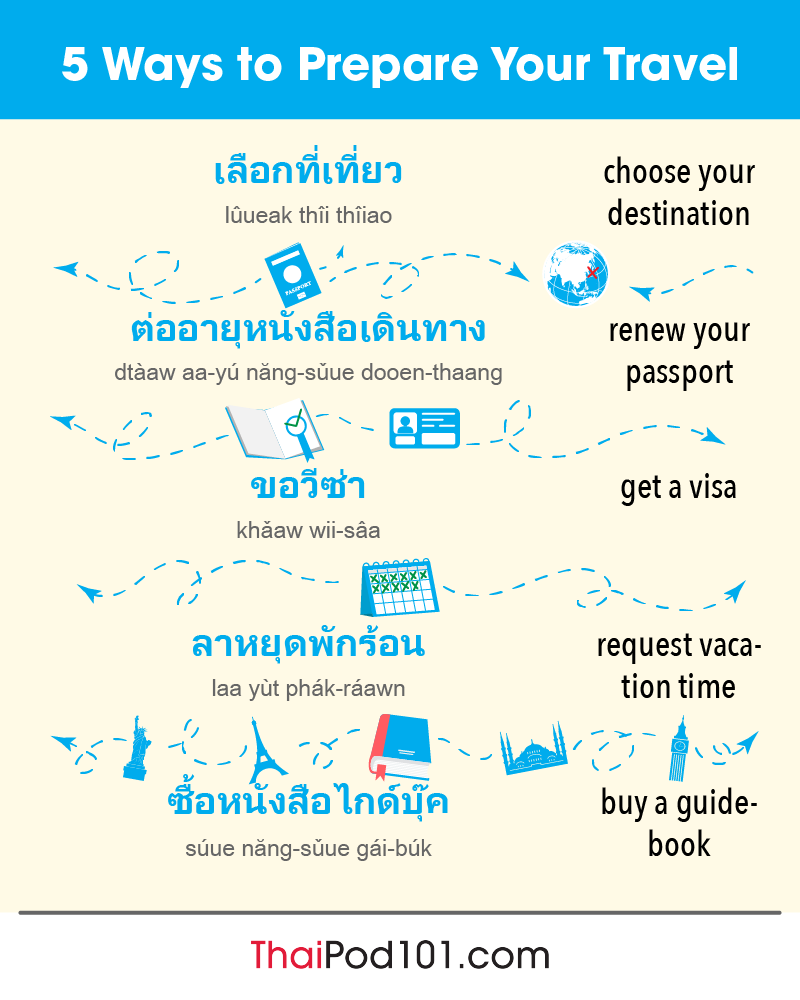
Cultural Etiquette and Customs
Understanding Thai customs and traditions
Thailand is a country rich in customs and traditions, and showing respect for the local culture is essential. One important aspect of Thai culture is the wai, a traditional greeting where you place your palms together in a prayer-like gesture and slightly bow your head. Thais appreciate when foreigners participate in this gesture, especially when visiting temples or meeting elderly locals.
Respecting religious practices
Thailand is predominantly a Buddhist country, and temples hold great significance in Thai culture. When visiting a temple, it’s important to dress modestly, cover your shoulders and knees, and remove your shoes before entering. It’s also considered respectful to refrain from pointing your feet at Buddha statues as feet are considered the lowest part of the body.
Proper behavior in temples and sacred sites
When visiting Thai temples or sacred sites, it’s important to maintain a respectful demeanor. Avoid loud conversation, touching sacred objects, or taking photos without permission. If there are monks present, it’s customary to make space for them and not to disturb their meditation or prayer.
Celebrations and Festivals
Learning about Thai festivals
Thailand is famous for its vibrant festivals and celebrations. Songkran, the Thai New Year, is one of the most anticipated festivals, where people joyfully splash water on each other to symbolize washing away the previous year’s troubles. The Loy Krathong festival, held in November, involves releasing small floating baskets made from banana leaves into rivers to pay respect to the water goddess.
Vocabulary for participating in celebrations
To fully immerse yourself in Thai celebrations, learning a few festival-related phrases will make the experience more enjoyable. To wish someone a happy new year during Songkran, you can say “Sawatdee pee mai” pronounced as sa-wat-dee-pee-mai. And during Loy Krathong, you can say “Suk san wan Loy Krathong” pronounced as suk-san-wan-loy-kra-thong to wish someone a happy Loy Krathong day.
Traditional games and activities
Participating in traditional Thai games and activities is a fantastic way to connect with locals and embrace the Thai culture. From Muay Thai, the national sport of Thailand, to Sepak Takraw, a popular ball game, there are plenty of opportunities to join in the fun and create lasting memories. Engaging with locals and learning these activities will undoubtedly enrich your travel experience.
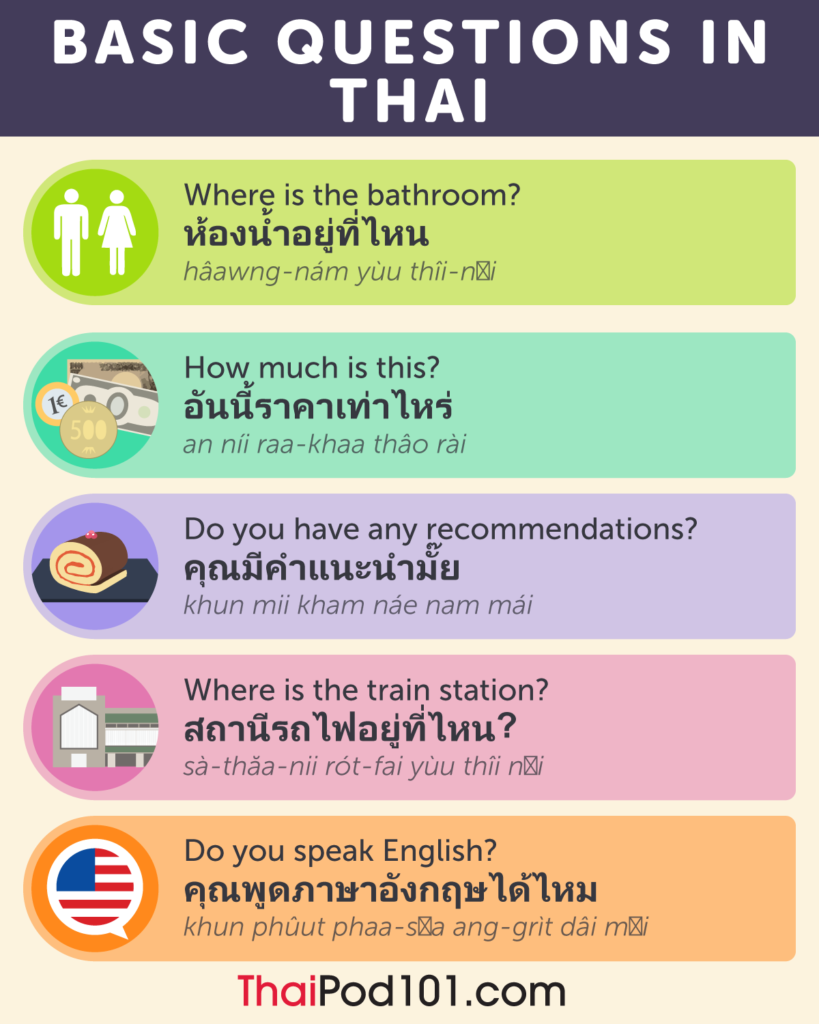
Useful Phrases for Everyday Situations
Numbers, time, and dates
Knowing basic numbers, time, and dates can be incredibly helpful for everyday interactions. Learning numbers from one to ten in Thai is relatively straightforward. One – “Neung,” two – “Song,” three – “Sam,” four – “See,” five – “Ha,” six – “Hok,” seven – “Jet,” eight – “Paet,” nine – “Kao,” ten – “Sip.” To ask for the time, you can say “Amarey gi mong?” pronounced as ah-ma-ray-gee-mohng. And to inquire about the date, you can say “Wan nii ngay a-rai?” pronounced as wan-ni-ngay-a-rye.
Expressing emotions and preferences
Being able to express your emotions and preferences is essential for effective communication. To say “I’m happy” in Thai, you can say “Pom yim suk” pronounced as pom-yeem-suk. If you’re feeling sad, you can say “Pom thuk jai.” To share your preferences, you can say “I like” by saying “Pom chop” followed by the item or activity you enjoy. For example, “Pom chop roti” means “I like roti.”
Asking for help and directions
Lastly, knowing how to ask for help or directions in Thai can save you a lot of time and confusion. To ask for help, you can say “Chuay chan dieow” pronounced as chaw-ay-chan-diew. And to ask for directions, you can say “Pai nai krup/kha?” pronounced as pie-nai-krup/ka. Thais are generally friendly and willing to assist, so don’t hesitate to ask for guidance when needed.
Conclusion
The value of learning essential Thai phrases for your travel experience
Learning the Thai language is an enriching experience that will greatly enhance your travel adventures in Thailand. By familiarizing yourself with basic Thai phrases for greetings, transportation, ordering food, shopping, emergencies, and cultural etiquette, you’ll be able to connect with locals on a deeper level, navigate everyday situations with ease, and immerse yourself in the vibrant Thai culture. So, take the time to learn these must-know Thai phrases and get ready for an unforgettable journey in the Land of Smiles.
